Things we like
- Great chassis
- Wide bandwidth
- Loaded spec
Not so much
- High price
- Interior lacks character
- Laggy screen
You enter the pub, sit down at the table and grab a menu, making a show of perusing the available options. It’s all a charade; you know exactly what you’re going to order, you’ve known for hours. You’re going to choose the chicken parmigiana – chances are everyone is.
The reason the chicken parmi (or parma) is the default pub choice is the same reason the Volkswagen Golf GTI is the default hot hatch choice – you know what you’re going to get. In both cases the recipe hasn’t changed much in decades and nor has it had to because if it ain’t broke, don’t fix it.
This only makes it all the more remarkable that for the eighth generation of its iconic fast five-door Volkswagen is fiddling with the recipe, if only slightly. If we return to the chicken parmigiana metaphor, the VW has stuffed a few spicy jalapeños between the ham and the cheese.
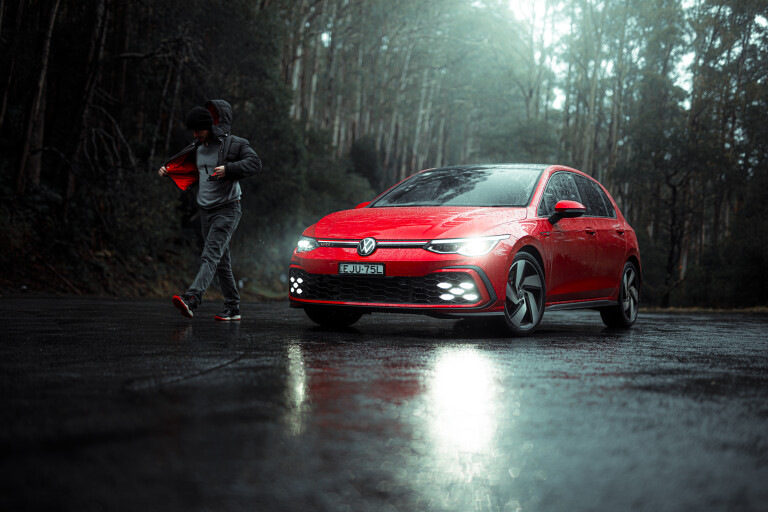
No standard Golf GTI has ever been this, well, serious. Its mechanical specification effectively mirrors that of the previous generation Golf GTI Performance, including the fourth evolution of the long-serving EA888 engine, which produces 180kW from 5000-6200rpm and 370Nm from 1600-4300rpm.
For the first time a proper limited-slip front differential is standard on a ‘normal’ GTI, the multi-plate unit is electronically rather than mechanically controlled in order to minimise steering corruption. A six-speed manual is available overseas, but locally only the new seven-speed ‘shift by wire’ dual-clutch gearbox will be offered, meaning there’s no longer any physical connection between the gear lever and the ’box itself.
Under the skin it seems as before, with a strut/A-arm front end and multi-link rear controlling 18.0 x 7.5-inch wheels wrapped in 225/40 tyres – in this case, Goodyears. However, the devil is in the detail. Spring rates have increased 5 per cent front and 15 per cent rear, bushings and bearings have gone under the microscope, adaptive dampers are standard and an aluminium subframe stiffens the front end and sheds three kilograms.
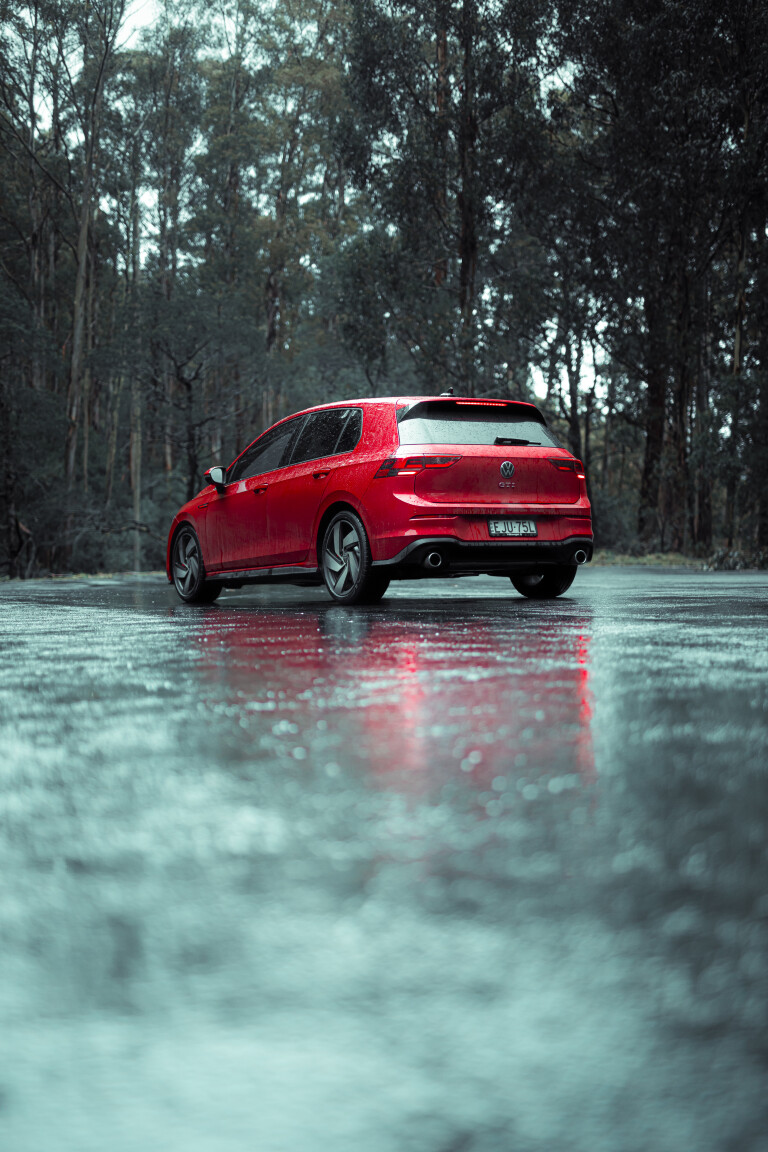
"This is the most cohesive Golf GTI yet"
What’s more, the suspension and differential are both under the command of the new Vehicle Dynamics Manager, a “higher level control system [that] centrally coordinates all electro-mechanical running gear functions,” according to Karsten Schebsdat, VW’s head of drive dynamics, steering and control systems.
Let’s not leave you hanging any longer – it works. This is easily the sharpest, most capable and cohesive Golf GTI yet. As you can see from the imagery, the conditions weren’t exactly conducive to performance driving, yet the Mk8 was rarely flustered, extracting remarkable levels of lateral grip from the sodden surface.
The steering is worthy of note. It remains a variable-rate rack that allows a degree of high-speed sneeze factor yet quickens as lock is applied with a maximum of 2.1 turns, but whereas these systems can sometimes feel unnatural in their progression when responding to large inputs, the latest GTI has somehow made the variable feel linear. It does feel as though the wheel has increased in diameter, however.
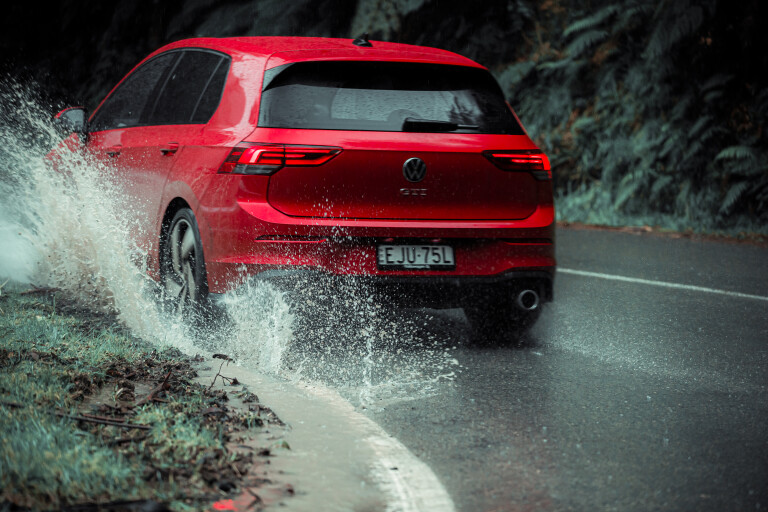
Volkswagen claims its “running gear engineers have in effect entirely eliminated understeer,” a bold statement but one that appears to be accurate, on-road at least. The front end refuses to relinquish its purchase even as cornering speeds edge up to twice that written on the yellow warning sign – in the wet don’t forget – and the rear is equally unflustered, though can be convinced to shuffle slightly on a trailed brake.
Traction has traditionally been a GTI bugbear but while it still leans on the electronics heavily in these conditions, once third gear has been clicked more often that not the light ceases to flash. The one disadvantage of a front limited-slip diff is that once traction is lost both wheels slide across the road, but it’s an easy issue to drive around with a little throttle control.
ESP Sport is deftly tuned and unintrusive. The stability control can also be deactivated completely for the first time in a base GTI, but we’ll leave that until we get on track. An Individual mode is still offered in order to mix and match drivetrain, steering and suspension settings – the latter now adjustable through 15 different damper rates – but to be honest Sport is beautifully judged for fast driving. The steering adds a little extra resistance and the suspension retains its compliance but with fantastic body control.
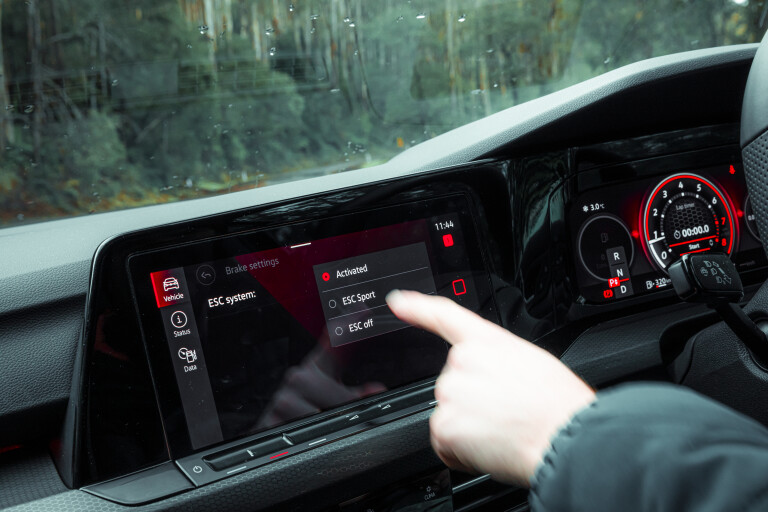
The engine is familiar but has now also been developed and refined to an incredibly high standard. It pulls from virtually no rpm – thank peak torque from 1600rpm for that – and remains perched on this power plateau for the next 4500rpm, at which point the next gear will be selected whether you like it or not. Happily, the new gearbox is more obedient in the other direction, firing in downshifts that whip the digital tachometer around to north of 6000rpm.
It even makes a good noise; a little muted, but less obviously synthesised than the same engine in the Skoda Octavia RS. It’s quick, too. The standard launch control system provokes time-sapping wheelspin, but with a bit of patience off the line the front tyres hook up and rocket it to 100km/h in just 6.2sec – besting the official claim by 0.2sec – and on to a 14.3sec quarter mile at 163.7km/h.
Crucially, this added dynamic ability hasn’t come at the expense of the GTI’s everyday useability. There is now a slight edge to the ride, however, the increase in firmness compared to its predecessor is probably roughly equal to the increase in front spring rate – about five per cent. For the expansion of its dynamic prowess to come with so little compromise feels like a masterstroke.
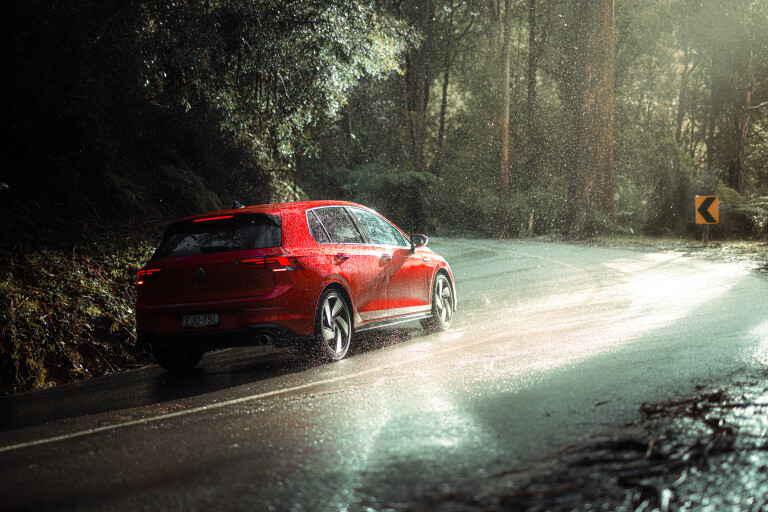
A couple of colleagues discovered an unpleasant exhaust resonance at certain speeds and throttle openings, but by and large the Mk8 GTI pulls off the same trick as its seven predecessors, as there is virtually no environment in which it doesn’t excel.
One ace it does have up its sleeve over previous GTIs is the ability to virtually drive itself. As part of its IQ Drive suite of active safety systems, the Golf’s adaptive cruise with stop & go functions takes care of the throttle and brake and the lane keep deals with the steering, allowing large distances to be covered with minimal driver input. It’s both clever and impressive, though certainly not foolproof, and I suspect most people reading this are happy to provide those inputs themselves.
Regardless, it’s another string to the GTI’s bow, albeit one that comes at a cost. When the Mk7 GTI launched it began at $41,490 for the manual and $43,990 for the DSG, which means the MK8’s $53,100RRP requires a second take. And then a third.
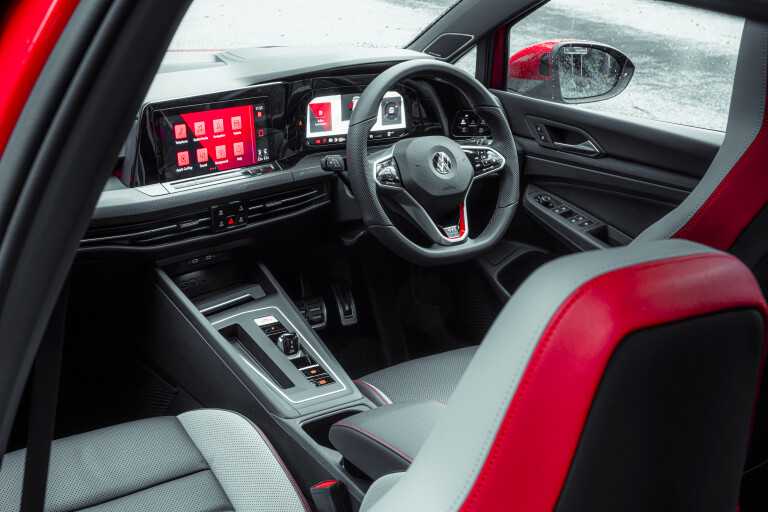
VW would rightly point to the car’s incredibly high specification, with Performance Pack mechanicals, adaptive dampers, all the active safety kit and its increased technology as justification, but the fact remains that a mere three years ago you could get yourself behind the wheel of a fast Golf for $37,490 – albeit for the back-to-basics, three-door GTI Original – while even the limited-edition, bells-and-whistles GTI 40 Years was $48,990.
There are only three options and our test car has the works: the $1500 Sound and Vision Package, which includes a head-up display and eight-speaker, 480W Harman Kardon stereo; the $3800 Luxury Package, with leather upholstery, heated and ventilated front seats, electrically operated driver’s seat, heated steering wheel and sunroof and $300 for the ‘Kings Red’ paint. White, two greys, blue and black are also available for no cost.
Add it all up and you’re looking at what feels like an eye-watering $58,700 before on-road costs, but it’s in step with the competition. A Megane RS Trophy DCT is $56,990, a top-spec WRX STI $59,440 and the new i30 N Premium $52,000, though it does make the Focus ST-3 look a bit of a bargain at $47,990. VW now offers a five-year warranty and a pair of servicing packages, $1450 for three years or $2300 for five.
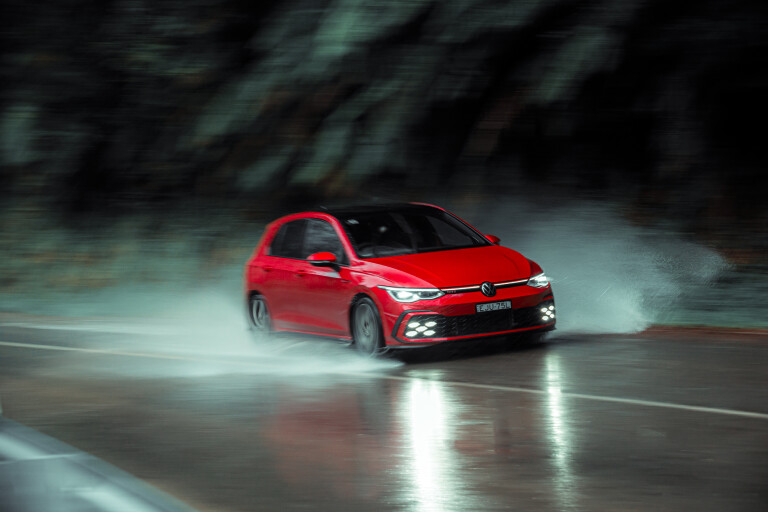
Nevertheless, the higher price raises expectations. The interior has plenty of gear, including triple-zone climate control, a pair of USB-C inputs front and rear, wireless charging and smartphone mirroring, voice control, digital instrument display and 10.0-inch infotainment touchscreen, but it’s also quite a sparse environment.
Volkswagen has intentionally gone for a minimalist aesthetic and there will be those to whom that appeals to. However, personally it feels like function has taken too much of a precedence over form. Our test car’s interior was an unrelenting sea of grey, enlivened only by some red piping and a start-stop button that flashes red like a heartbeat.
The standard tartan seats would help matters, I suspect, but in removing all the switchgear the interior is now largely featureless. The gear lever has been replaced by an apologetic stub (looks rather like one found in the 992 911) and there’s plenty of hard plastic in evidence.

As mentioned earlier, the steering wheel feels a little large and also a little chunky, while the number of controls on the spokes is initially daunting. In practice it’s actually very intuitive, allowing easy navigation of the widely customisable digital instrument display, that has a number of different themes and can display basically any information you’d want to know.
The centre infotainment screen has come in for some criticism. However, after slight initial frustration – consulting the handbook revealed the nondescript square was the ‘home’ button, obvious to all but me it seems, which solved all manner of problems – it proved to be reasonably slick.
Shortcut keys on the dash and sliders for the commonly used volume and temperature controls allow most functions to be easily accessed, especially with an owner’s familiarity. The exception is various vehicle functions such as stop-start or ESP Sport; what used to be a simple button tap is now a process requiring various taps and swipes, the latter often being unresponsive – it feels a step too far.
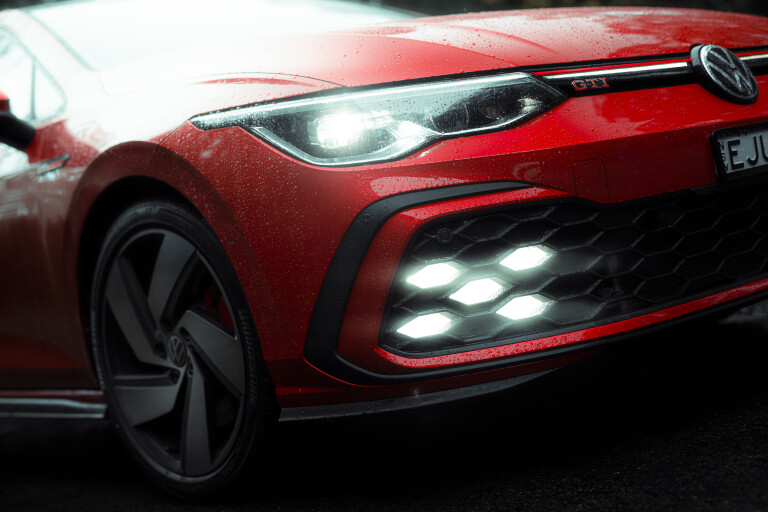
The eighth-generation Golf GTI is a very impressive machine. In many ways it’s the quintessential GTI; a better performance car than ever before yet with the latest semi-autonomous systems that allow it to shoulder the burden of the daily grind if you’re not in the mood. Volkswagen is confident buyers won’t be deterred by the new car’s tech-heavy focus, austere interior and higher price tag. Only time will tell if this spicier parmigiana remains the pub favourite.
The Strip
2021 Volkswagen Golf GTI
Heathcote Park Raceway. Driver -Alex Inwood
Official timing by Vbox Australia
| 0-10km/h | 0.6 |
|---|---|
| 0-20km/h | 1.1 |
| 0-30km/h | 1.7 |
| 0-40km/h | 2.3 |
| 0-50km/h | 2.8 |
| 0-60km/h | 3.4 |
| 0-70km/h | 4.0 |
| 0-80km/h | 4.6 |
| 0-90km/h | 5.4 |
| 0-100km/h | 6.2 |
| 0-110km/h | 7.1 |
| 0-120km/h | 8.1 |
| 0-130km/h | 9.3 |
| 0-140km/h | 10.7 |
| 0-150km/h | 12.1 |
| 0-160km/h | 13.7 |
| 0-170km/h | 15.6 |
| 0-180km/h | 17.9 |
| 0-190km/h | 20.8 |
| 0-400m 14.3sec@ 163.7km/h | |
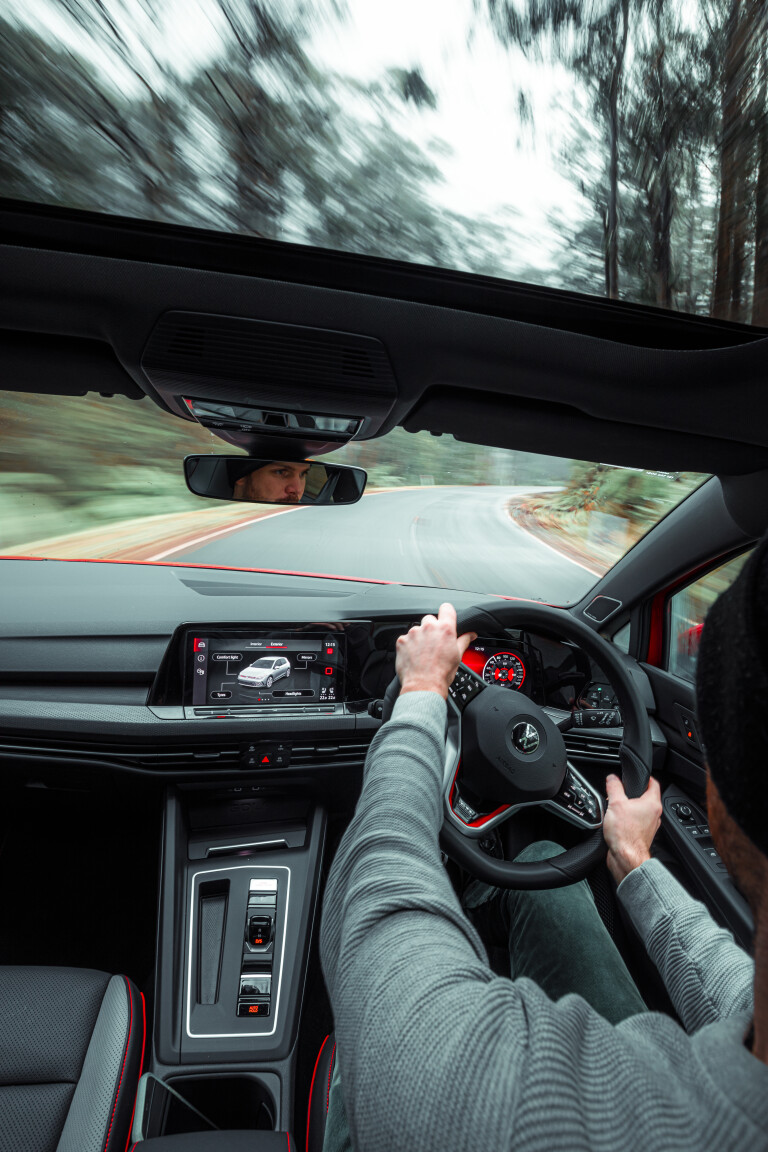
2021 Volkswagen GTI specs
Figures of Eight
| Body | 5-door, 5-seat hatchback |
|---|---|
| Drive | front-wheel |
| Engine | 1984cc inline-4cyl, DOHC, 16v, turbo |
| Bore x Stroke | 82.5 x 92.8mm |
| Compression | 9.6:1 |
| Power | 180kW @ 5000-6200rpm |
| Torque | 370Nm @ 1600-4300rpm |
| Power/Weight | 128kW/tonne |
| Transmission | 7-speed dual-clutch |
| Weight | 1409kg |
| Suspension | struts, A-arms, adaptive dampers, coil springs, anti-roll bar (f); multi-links, adaptive dampers, coil springs, anti-roll bar (r) |
| L/W/H | 4287/1789/1463mm |
| Wheelbase | 2631mm |
| Tracks | 1535/1513mm (f/r) |
| Steering | electrically assisted rack-and-pinion |
| Brakes | 340mm ventilated discs, single-piston calipers (f); 310mm ventilated discs, single-piston calipers (r) |
| Wheels | 18.0 x 7.5-inch (f/r) |
| Tyres | 225/40 R18 (f/r) Goodyear Eagle F1 |
| Price | $53,100 ($58,700 as tested) |
Things we like
- Great chassis
- Wide bandwidth
- Loaded spec
Not so much
- High price
- Interior lacks character
- Laggy screen

COMMENTS